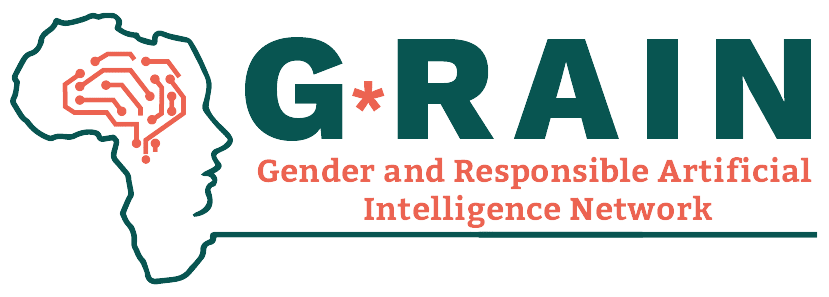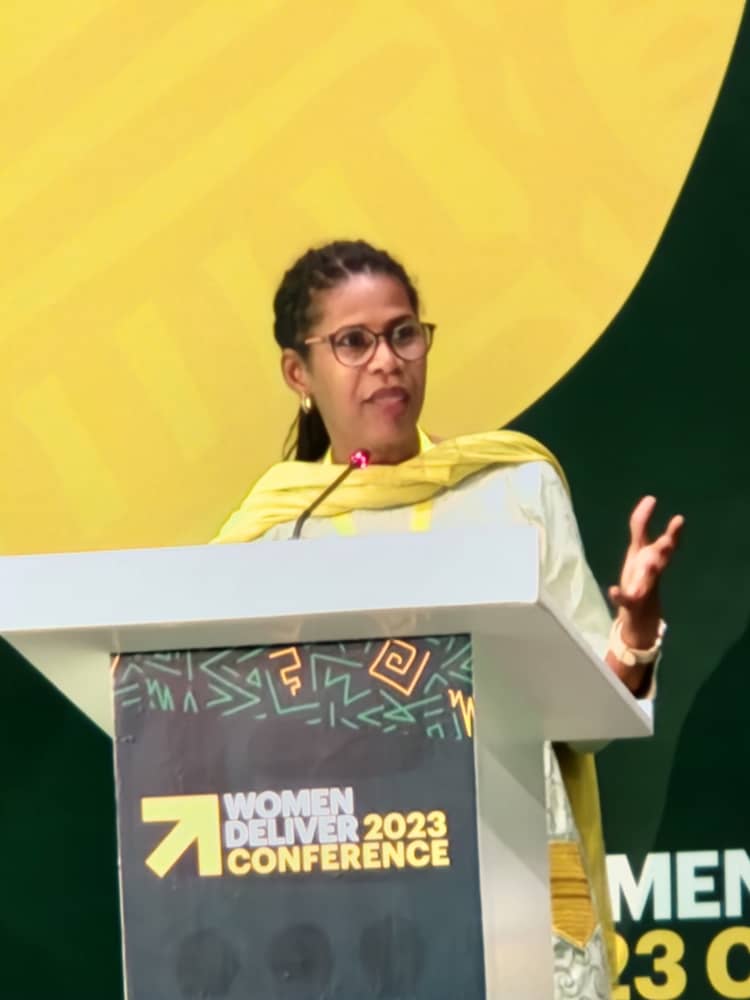As part of the celebration of International Women's Rights Day, GRAIN takes this opportunity to honour and thank these brilliant women for their transformative impact and unwavering commitment to creating an equitable, inclusive and sustainable future for generations to come through responsible research on artificial intelligence and gender. Mutiat Olaitan MOHAMMED from Nigeria, Shamira Ahmed from South Africa, Rebecca Ryakitimbo from the DRC, Dr. Joyce Nakatumba-Nabende from Uganda, Angella Ndaka and Chebet Moso and Juliet from Kenya are visionary researchers who are paving the way for a new era of progress and equality, by highlighting the crucial importance of gender diversity in the field of artificial intelligence.

Mutiat Olaitan MOHAMMED leads the Project on : AI for Women in Aquaculture (AI4WA) in Nigeria
The Nigerian is a proactive and results-oriented team player, an advocate of the circular economy and turning waste into wealth. Mutiat has a remarkable track record of participating in and presenting research papers on the valorisation of agricultural waste.
Shamira Ahmed directs the Research Project on : ''Responsible AI for gender equality in Africa's circular economy''
Shamira is a policy entrepreneur, an experienced quantitative economist and an interdisciplinary policy and research specialist. She has a track record of providing technical assistance to policymakers and regulators in sub-Saharan Africa, including co-authoring confidential and non-confidential knowledge products such as the African Union Commission's Data Policy Framework, among others.


Rebecca Ryakitimbo looks at the subject of : Gender mainstreaming in AI: a perspective from Francophone and Anglophone East Africa
She is a technologist, writer, researcher and nature lover. Her work has focused on harnessing technology solutions to solve community challenges, including digital policy engagement. Co-founder of Digital Grassroots, she worked as part of a project team with the Kondoa Community Network using TV white space technology to bring internet connectivity to rural communities.
Dr. Joyce Nakatumba-Nabende (Uganda) focuses on : Cnderstanding gender bias in the construction of artificial intelligence models in the African context
Joyce Nakatumba-Nabende is a lecturer in the Department of Computer Science. She heads Makerere's artificial intelligence laboratory, where she has worked on research projects aimed at developing and applying artificial intelligence and machine learning methods and tools to improve the quality of life, particularly in developing countries. She is a board member of Data Science Africa and a member of the ACM Education Advisory Committee.


Juliet Chebet Moso at the helm of the project '' An artificial intelligence-based model for the analysis of gender inequality in STEM programmes and career projection in Kenya''
Juliet Chebet Moso holds a PhD in Computer Science from the University of Reims Champagne-Ardenne, an MSc in Computer Science from the University of Nairobi and a BSc in Computer Science from Egerton University. She is currently a lecturer at Dedan Kimathi University of Technology in Kenya.
Angella Ndaka is carrying out the project on digitisation for mama-Mboga : Is the involvement and inclusion of women in agri-tech AI important? experience of women in the informal agricultural sector in kenya
She is an Early Career Researcher in Critical Sociotechnical Studies at the University of Otago, Executive Director and Head of AI Ethics and Governance Research at the Centre for African Epistemic Justice. Angella is a thought leader in complex and critical discourses on AI and emerging technologies, and a strong advocate for the critical inclusion of women and other minority groups in technology co-design and other critical decision-making spaces. Her thought-provoking conversations and discursive politics around AI have earned her global recognition, placing her on the list of the 100 Brightest Women in AI Ethics in 2023.

The He4She of the GRAIN network

Natnael Tilahun is working on a project entitled ''Gender diversity and equity in the AI ecosystem: an SLR of African languages'''
He has a strong academic and professional background in computer science and software engineering. Natnael has accumulated over four years of valuable professional experience, excelling in a variety of roles and projects. Passionate about artificial intelligence, Natnael is dedicated to advancing the field and pursuing ambitious goals.
Dr Olayinka Jelili Yusuf is the team leader of the project called AI for women in agriculture - AI4WIA
The team leader, who has a PhD in agricultural extension and rural sociology, specialises in agricultural technology transfer, gender and rural development.


Walelign Tewabe Sewunetie leads the project on : Natural Language Processing (NLP), Big Data Analytics, Human Data Mining
He has over 14 years' corporate experience in teaching, consultancy, research and projects. He is a graduate of Arba Minch University Institute of Technology. His research interests include computer science, AI, NLP, intelligent tutoring systems, software engineering and more. His doctoral research topic is the design and development of automatic question generation models.
On Monday 15 May 2023 in Saly, the IPAR took part in a "panel of experts on artificial intelligence as a lever for development". Read more
The Women Deliver Conference (WD2023) is one of the largest multi-sectoral gatherings aimed at advancing gender equality. Co-created Read more






